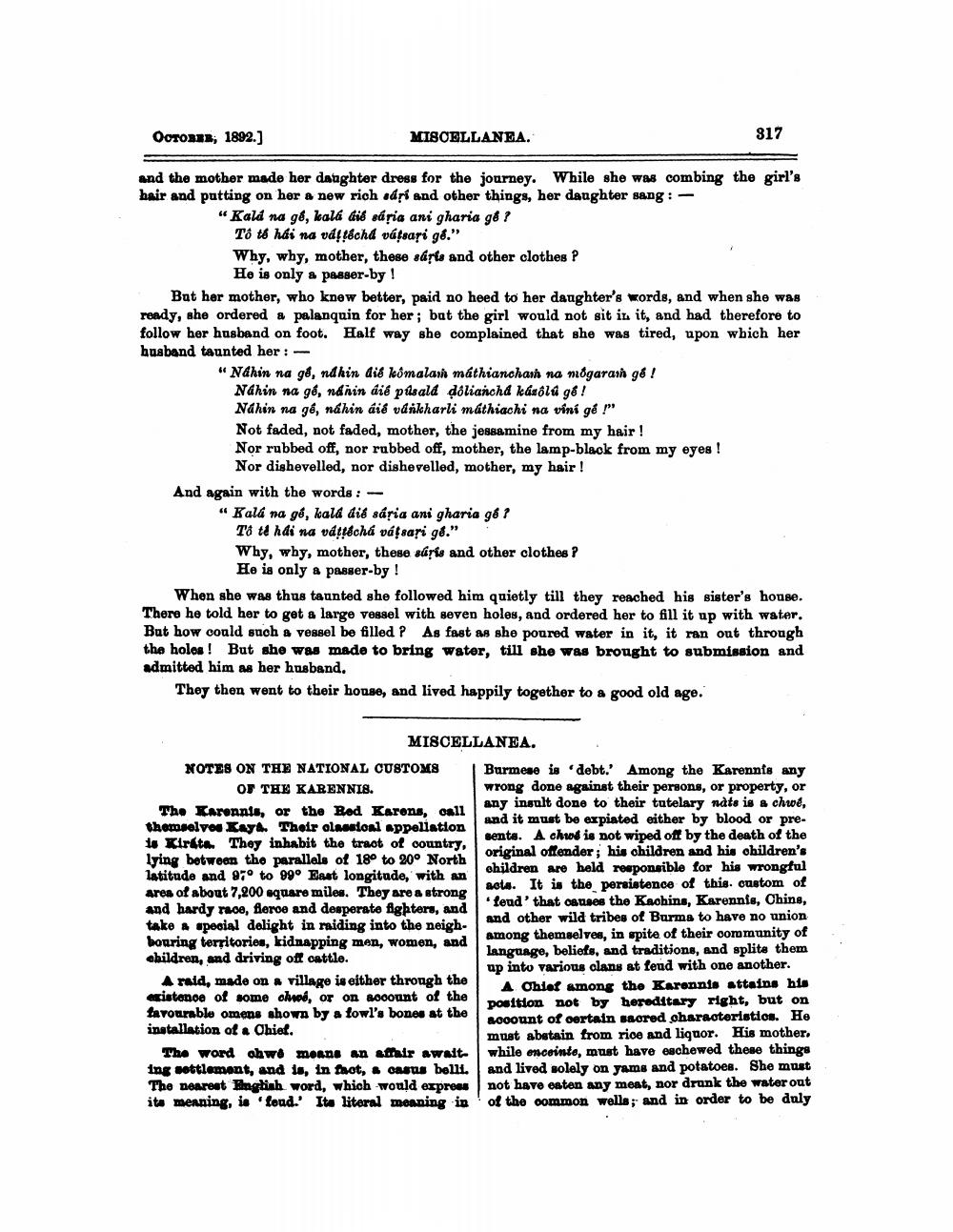________________
Остовив; 1892.]
and the mother made her daughter dress for the journey. While she was combing the girl's hair and putting on her a new rich sari and other things, her daughter sang :
MISCELLANEA.
"Kalá na gé, kalá dié sária ani gharia gé?
Tô tổ hải na và téch
vútsari gỗ.”
Why, why, mother, these sárts and other clothes ?
He is only a passer-by!
But her mother, who knew better, paid no heed to her daughter's words, and when she was ready, she ordered a palanquin for her; but the girl would not sit in it, and had therefore to follow her husband on foot. Half way she complained that she was tired, upon which her husband taunted her: :
"Nahin na g8, ndhin dié kômalam mathiancham na môgaram ge! Nahin na gé, nánin dié pûsald dôliancha kásôlû ge!
Nahin na gé, náhin áié váňkharli máthiachi na viní gé !"
Not faded, not faded, mother, the jessamine from my hair!
Nor rubbed off, nor rubbed off, mother, the lamp-black from my eyes!
Nor dishevelled, nor dishevelled, mother, my hair!
And again with the words:
"Kalá na gé, kalá dié sária ani gharia gé?
To té hai na váṭṭéchá vátsari gé."
Why, why, mother, these saris and other clothes? He is only a passer-by!
When she was thus taunted she followed him quietly till they reached his sister's house. There he told her to get a large vessel with seven holes, and ordered her to fill it up with water. But how could such a vessel be filled? As fast as she poured water in it, it ran out through the holes! But she was made to bring water, till she was brought to submission and admitted him as her husband.
They then went to their house, and lived happily together to a good old age.
MISCELLANEA.
317
NOTES ON THE NATIONAL CUSTOMS
OF THE KARENNIS.
The Karennis, or the Red Karens, call themselves Kay. Their classical appellation
is Kiráta. They inhabit the tract of country, lying between the parallels of 18° to 20° North latitude and 97° to 99° East longitude, with an area of about 7,200 square miles. They are a strong and hardy race, fierce and desperate fighters, and take a special delight in raiding into the neighbouring territories, kidnapping men, women, and children, and driving off cattle.
A raid, made on a village is either through the existence of some chwé, or on account of the favourable omens shown by a fowl's bones at the installation of a Chief.
The word chwe means an affair awaiting settlement, and is, in fact, a casus belli. The nearest English word, which would express its meaning, is 'feud.' Its literal meaning in
Burmese is debt.' Among the Karennis any wrong done against their persons, or property, or any insult done to their tutelary nàts is a chwé, and it must be expiated either by blood or presents. A chud is not wiped off by the death of the
original offender; his children and his children's children are held responsible for his wrongful acts. It is the persistence of this. custom of 'feud' that causes the Kachins, Karennis, Chins, and other wild tribes of Burma to have no union among themselves, in spite of their community of language, beliefs, and traditions, and splits them up into various clans at feud with one another.
A Chief among the Karennis attains his position not by hereditary right, but on account of certain sacred characteristics. He must abstain from rice and liquor. His mother. while enceinte, must have eschewed these things and lived solely on yams and potatoes. She must not have eaten any meat, nor drunk the water out of the common wells; and in order to be duly




